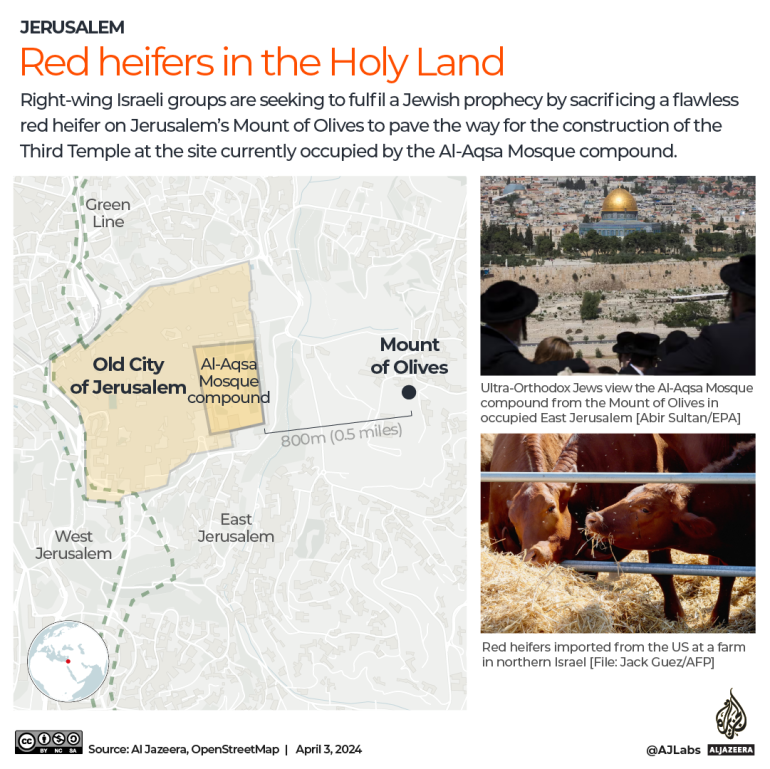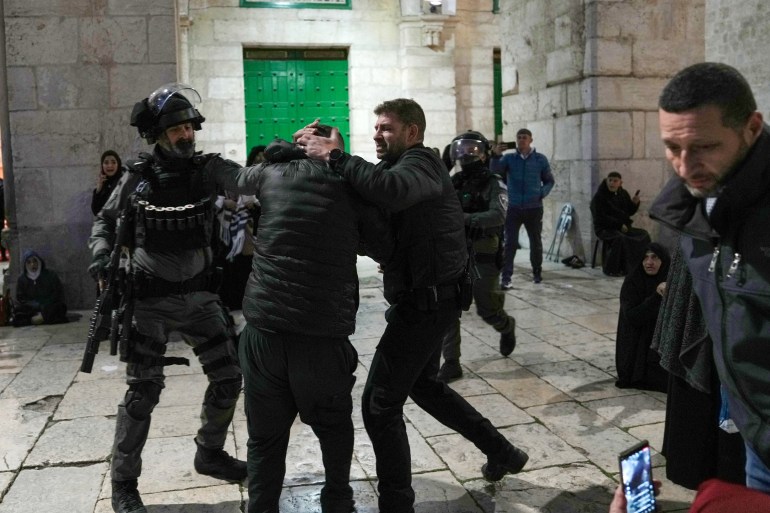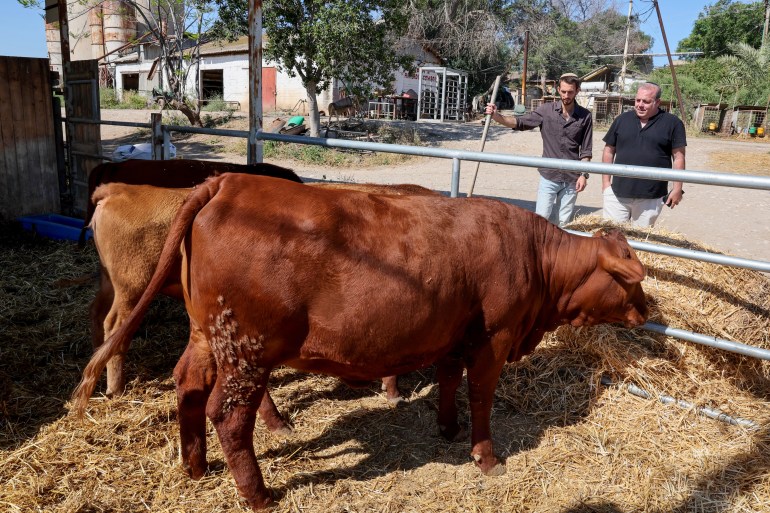They are five pure red heifers without blemish who have never worked, given birth, been milked or worn a yoke.
These red heifers and the archaic ritual they were brought to Israel for stand at the heart of a convoluted effort by a segment of ultranationalist Jews to destroy the Al-Aqsa Mosque compound, the third holiest site in Islam that has stood on a hill in the Old City of Jerusalem for more than 1,000 years, and replace it with a “Third Temple”.
This minority ultranationalist push flies in the face of Jewish scholarship, which rules that a “Third Temple” can only be constructed after the coming of the awaited Messiah to usher in the “Kingdom of God” – not to bring about the return of the Messiah to Earth.
Members of these “Temple Movement” groups are also pushing to perform Jewish rites in the Al-Aqsa Mosque compound, in violation of the chief rabbinate’s longstanding prohibition of the presence of Jews at Al-Aqsa due to the holiness of the site.
Heifer prophecy
According to the Old Testament, the two Jewish temples that stood where the Al-Aqsa compound stands today were ritually pure as were all instruments, garments and people who served in them.

The first temple stood from 1000 to 586 BCE and the second from 515 BCE to 70 AD and the third temple is what ultranationalist organisations have been working towards for decades.
Palestinians have for decades feared Israeli attempts to take over Al-Aqsa, which is the direction Muslims used to pray towards before the Kaaba in Mecca.
These fears have been particularly acute since 1967 when Israel illegally occupied East Jerusalem along with the West Bank and Gaza in the wake of the 1967 War.
The growing Jewish presence in Al-Aqsa and frequent attacks by Israeli security forces on Palestinian worshippers in recent years have only increased those fears.
According to the reasoning of ultranationalist Jewish organisations like the Temple Institute, a “Third Temple” cannot be built until Al-Aqsa is destroyed and the compound is purified, along with garments, utensils and hundreds of men of a particular lineage who have been trained for the priesthood who all stand ready to serve in this temple.
The purification is through a mixture of ashes – of a sacrificed red heifer, red yarn, cedar wood and hyssop – with fresh spring water collected by ritually pure children who were born and raised under certain conditions. This ash mixture is believed to remain effective for up to 100 years and can be mixed with spring water as needed.

The search for these pure red heifers is not new and has been a main aim of the Temple Institute since its founding in 1987, with fundraising efforts to breed one through IVF and to search all over the world for one.
Until 2022, when five red yearlings were donated by an evangelical farmer from Texas, United States, and flown to Israel as “pets” to get around restrictions on importing live animals as livestock at the time.
There have also been efforts to secure and prepare a plot of land on the Mount of Olives, which overlooks the Al-Aqsa compound and would enable the priest overseeing the killing of the heifer to sprinkle her blood towards Al-Aqsa as detailed in the Bible.
Sacrifice imminent?
There are indications that the Temple Movement is preparing to sacrifice a red heifer with the support of the Israeli government, according to the Israeli NGO Ir Amim.
The Israeli Ministry of Agriculture and Rural Development circumvented protocols when initially seeking permission to import red heifers, Ir Amim noted in a report in August, an example of increasing government involvement as the US was not a country approved for the import of live animals from at the time.
Netanel Isaac, the director general of the Ministry of Jerusalem Affairs and Heritage, delivered a speech in honour of the heifers’ arrival at Ben Gurion airport in September 2022 and admitted that the ministry has been funding the development of the Mount of Olives area where the ceremony is planned.

The Ministry of Agriculture, the Temple Institute and evangelical Christian group Boneh Israel did not respond to Al Jazeera’s requests for comment before publication.
In a video from January posted on Boneh Israel’s website, Michael Samuel Smith, a Christian preacher working to bring forth the temple prophecy, said the red heifers they have been raising in Shiloh have come of sacrificial age.
“This is the first time in nearly 2,000 years a successful red heifer has come about,” Smith said in the video. “It is still our opinion the first successful red heifer sacrifice will take place in the spring of 2024 around the Passover to Pentecost timeframe.
“We believe God is going to reveal himself through the efforts of this future event. It is truly a sign of the times, most especially for Jews in Israel.”
Passover will be towards the end of April while Pentecost is in mid-May.
Aviv Tatarsky, a senior Ir Amim researcher, told Al Jazeera that in Jewish religious texts, a lot of the details around sacrificing and burning a red heifer are ambiguous.
“What is this ceremonial burning? What exactly is a red heifer? This is not at all clear or known because the last time this was done, it was done when there was a Jewish temple 2,000 years ago,” Tatarsky explained.
“[I]t’s not 100 percent clear. Until recently, there were some extreme and fringe people who were working on it, but very few people took it seriously,” he added.
‘Detestable religious myth’?
Defending Al-Aqsa is an important mission for Palestinian Muslims, worshippers and armed fighters alike.
In a speech marking 100 days of Israel’s war on Gaza which started after the “Al-Aqsa Flood” attack by Palestinian armed fighters from Gaza, Qassam Brigades spokesperson Abu Obeida said the red heifers are a concern, and the potential sacrifice is a “detestable religious myth designed for aggression against the feelings of an entire nation”.
Tatarsky sees that the real “danger”, of the Temple Movement is that it has “worked against Muslim freedom of worship” and has consistently been “trying to create some kind of Jewish control” over Al-Aqsa, backed by the Israeli government.
The Temple Movement says it plans to build the temple “within years”, according to Ir Amim. Still, Tatarsky said he does not believe the red heifer ceremony or the construction of the temple will happen “any time soon”.
He added that, despite state support for a Jewish presence in Al-Aqsa, he does not believe there is strong enough backing from the government for a group to try to destroy Al-Aqsa, which is subject to numerous agreements and regulations.
As for the heifer sacrifice, “they need recognition of a very wide public and of decision-makers and all kinds of important rabbis. If they just do it [in April], it won’t be recognised, and all their effort will be for nothing.
“I don’t underestimate the danger of these groups. … [but] building the temple means a completely different Israel from today.”